The Kaiser Family Foundation/Washington Post Climate Change Survey
Overview
The latest partnership survey from the Kaiser Family Foundation and The Washington Post examines the public’s views, awareness, and preferences related to climate change. The poll assesses the public’s belief in whether human activity is causing the climate to change, as well as levels of concern and support for policy solutions to address climate change. It also probes the public’s willingness to accept the types of trade-offs that are associated with policy solutions, and finds that there are limits to public support and engagement on this issue. A companion survey of U.S. teens explores how this age group views the issue of climate change and its potential impact on their generation.
This survey is the 34th in a series of surveys dating back to 1995 that have been conducted as a part of The Washington Post/Kaiser Family Foundation Survey Project.
Read The Washington Post’s reporting:
Americans increasingly see climate change as a crisis, poll shows
Most American teens are frightened by climate change, poll finds, and about 1 in 4 are taking action
Americans would rather reduce oil and gas exploration than ‘drill, baby, drill’
Regional weather patterns are viewed through partisan lenses, poll finds
Americans like Green New Deal’s goals, but they reject paying trillions to reach them
Americans broadly accept climate science, but many are fuzzy on the details
Main Findings
Executive Summary
The latest partnership survey from the Kaiser Family Foundation and The Washington Post examines the public’s views, awareness, and preferences related to climate change. Like surveys conducted by other organizations, our poll finds high levels of concern and support for policy solutions to address climate change. In this poll, we also probed the public’s willingness to accept the types of trade-offs that are inevitably associated with policy solutions, and find that there are limits to public support and engagement on this issue. The poll finds that eight in ten U.S. adults believe that human activity is causing changes to the world’s climate, and two-thirds think the U.S. government is doing too little to reduce greenhouse gas emissions. Yet while many see climate change as an urgent issue, most are not discussing it often with their family and friends, and most are not willing to make personal sacrifices such as paying higher taxes at the gas pump or on their electric bills. While majorities of Democrats, Republicans, and independents agree that human-caused climate change is happening, there are large divisions in how partisans view the urgency of the issue and potential solutions.
1 in 4 Americans donated money to charity or otherwise acted to express their climate change views. 1 in 4 teens took part in a climate-change protest, rally or school walkout, or otherwise engaged on the issue. More in new @KFF/@WashingtonPost poll
The survey also included a sample of U.S. teens ages 13-17, and finds that most teens view climate change as an important issue. However, rather than standing out as a singularly important issue for teens, it is one of many issues they view as important. About one quarter of teens report engaging politically on the issue of climate change (by participating in a protest or school walk-out, or contacting a government official), but teens are less likely than adults to say they regularly discuss the topic with friends.
This survey is the 34th in a series of surveys dating back to 1995 that have been conducted as a part of The Washington Post/Kaiser Family Foundation Survey Project.
Key Findings
Majorities of U.S. adults across parties believe human-caused climate change is happening, but Republicans are much more doubtful about the seriousness of the problem. Large majorities of Democrats (90%) and independents (82%) and a solid majority of Republicans (60%) agree that human activity is causing changes to the world’s climate, including an increase in average temperature. However, Democrats and independents are much more likely to be firm in their beliefs: 59% of Democrats and 43% of independents say they are very certain that human activity is causing climate change, compared to one in five Republicans. Moreover, a majority (56%) of Republicans say that when it comes to what is said in the news, the seriousness of global warming and climate change is generally exaggerated, while most Democrats say the seriousness of the problem is generally correct (48%) or generally underestimated (46%).
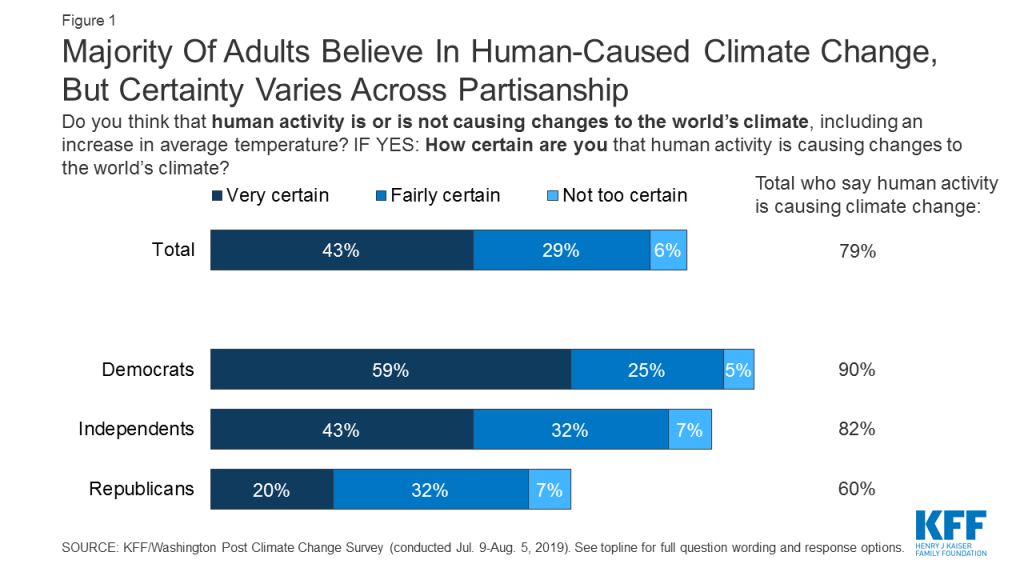
There are signs of increasing urgency around climate change, but also skepticism of government intervention. Thirty-eight percent of the public now calls climate change a “crisis,” up from 23% in a PRRI poll from 2014, driven by an increase among Democrats and independents. About half (52%) think that people need to act within the next 10 years to prevent the worst effects of climate change, or that it is already too late. Seven in ten are worried that climate change will cause harm to the health of people living in the U.S., and majorities say that businesses and corporations (72%), the U.S. government (67%), energy companies (65%), and their state government (60%) are doing too little to reduce greenhouse gas emissions. Despite this apparent sense of urgency and desire for action, people are skeptical of government intervention. Six in ten are worried that government regulations and taxes aimed at addressing climate change will cause financial stress for ordinary Americans, and about half (51%) are worried such government intervention will hurt the U.S. economy.
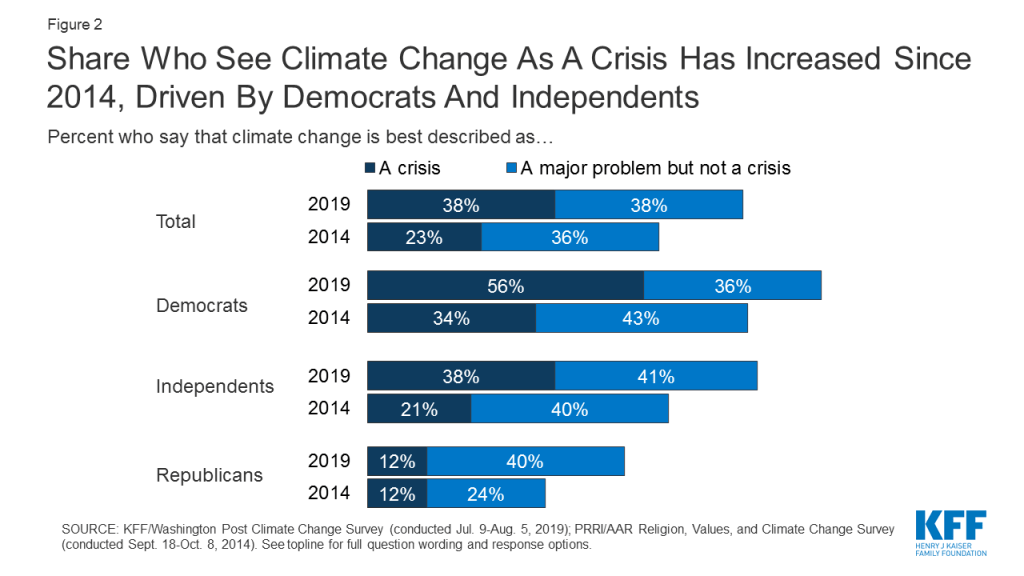
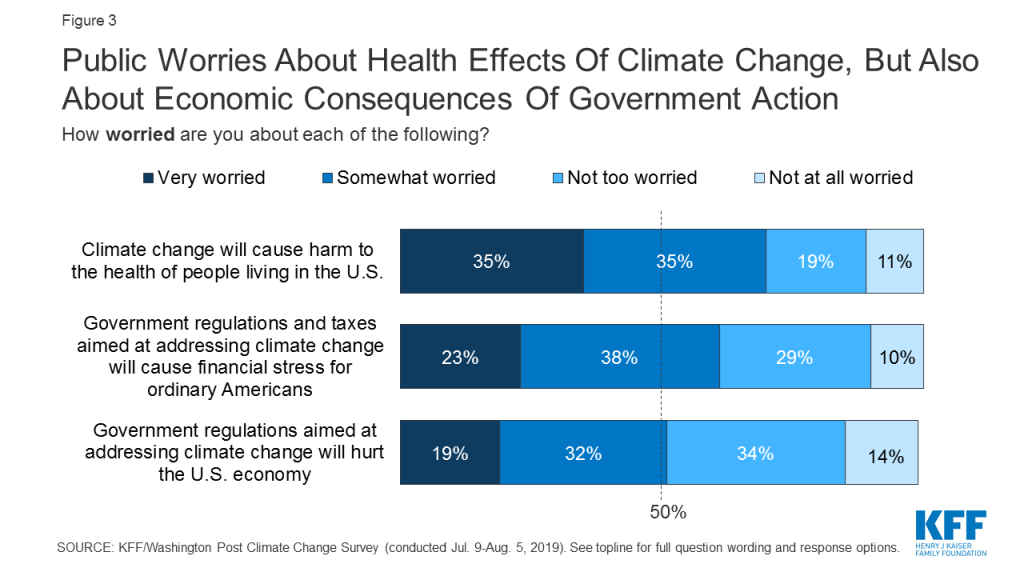
Climate change is not a frequent subject of dinner table conversations for most Americans, and few adults report any political engagement on the issue. About half of adults say they rarely or never discuss climate change with their family members (53%) or friends (54%), and just about one in ten say they often discuss the topic with either group (12% and 10%, respectively). Small shares say they have donated money to a charity working to address climate change (17%), contacted a government official (12%), or participated in a protest, rally, or other event (9%) to express their views on climate change.
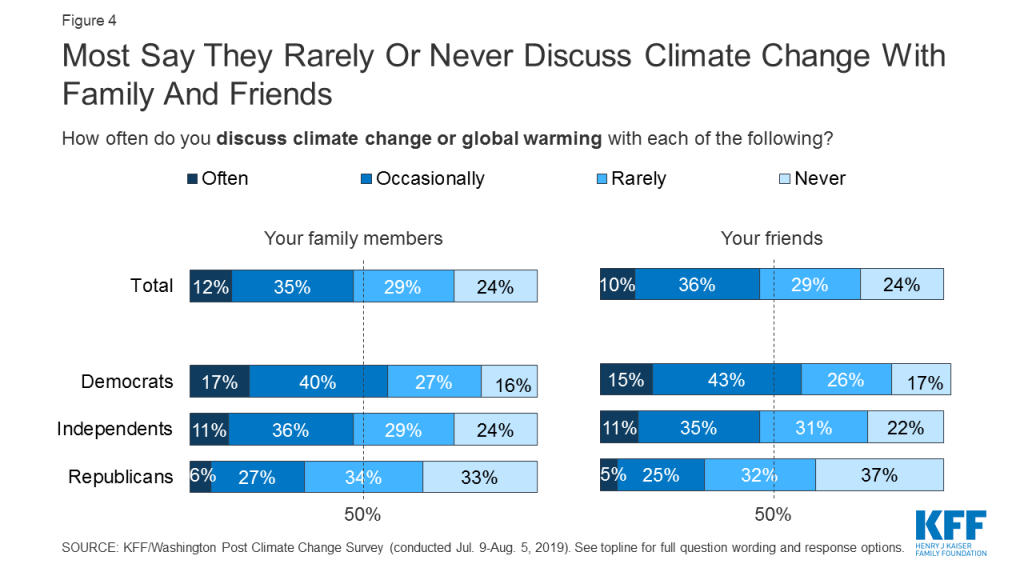
Few U.S. adults are willing to make personal sacrifices in the form of higher gas or electricity taxes in order to address climate change. Fewer than four in ten adults (37%) think that reducing the negative effects of global warming and climate change will require major sacrifices from ordinary Americans, while a plurality (48%) think it will require minor sacrifices and 14% say it won’t require much sacrifice at all. Majorities are willing to support raising taxes on wealthy households (68%) and on companies that burn fossil fuels, even if it may lead to increased electricity and transportation prices (60%), as ways to pay for policies aimed at reducing U.S. greenhouse gas emissions. But when it comes to taxes that are likely to hit consumers’ pocketbooks, support is much lower. About half (51%) oppose a $2 monthly tax on U.S. residential electric bills, and seven in ten (71%) are opposed to such a tax at the $10 a month level. Similarly, majorities oppose increasing the federal gasoline tax by 10 cents or 25 cents per gallon (64% and 74%, respectively). There are partisan divisions, but even majorities of Democrats oppose a $10 monthly electricity tax (60%) and a 25-cent per gallon gasoline tax (63%).
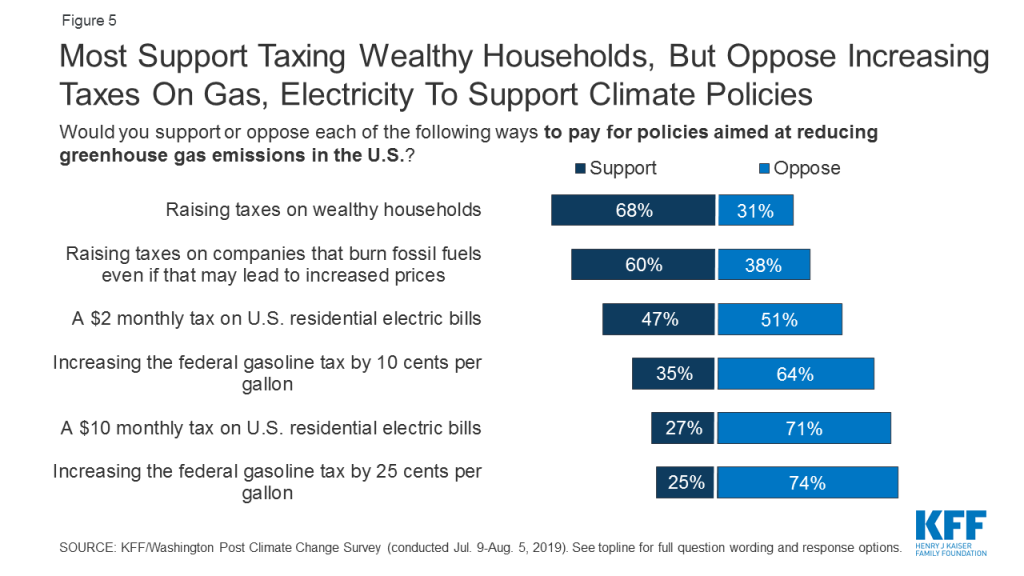
Democrats have an edge over Republicans when it comes to the issue of climate change, though majorities say both parties are doing too little. Democrats have a 21-percentage point advantage over Republicans in trust to handle climate change (38% vs. 17%), though a substantial 35% of the public say they trust neither party. Notably, majorities say that President Trump (66%), the Republican Party (69%), and the Democratic Party (56%) are doing too little to reduce greenhouse gas emissions. Two-thirds (67%) disapprove of President Trump’s handling of climate change (his lowest rating out of six issues tested), and a similar share (66%) disapprove of his plan to roll back fuel efficiency standards put in place by the Obama administration.
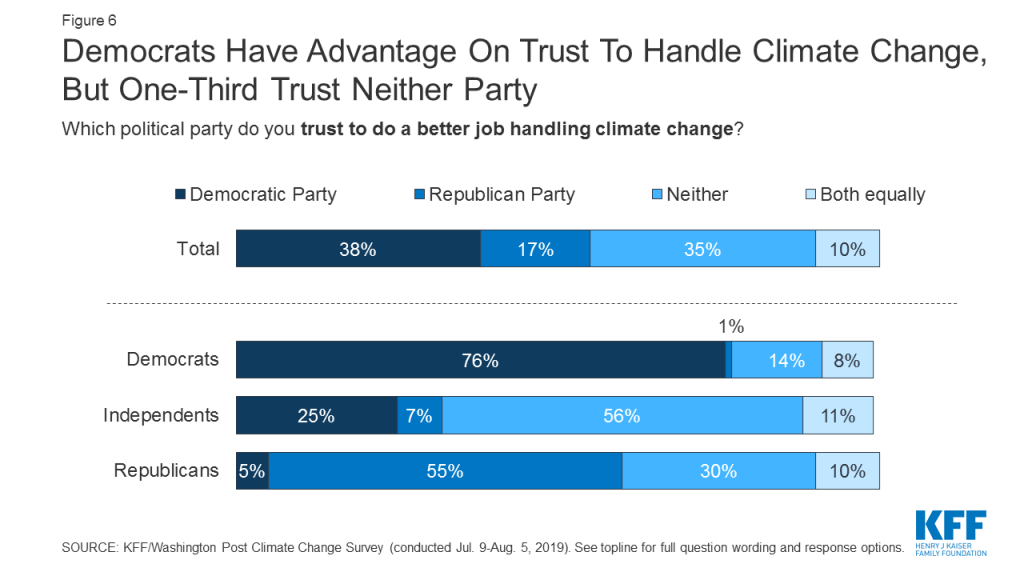
While most U.S. teens see climate change as an important issue, it does not stand out as a singular defining issue for their generation. Like adults, a large majority of teens (86%) believe that human-caused climate change is happening, though just under half (46%) are very certain. Six in ten teenagers (61%) say the issue of climate change is very or extremely important to them personally, making it one of many issues that teens view as important. Notably, about a third of teens (34%) say climate change is an extremely important issue, but rather than standing out as the top issue for teens, climate change ranks similarly to health care (38%), gun policy (35%), and the economy (32%). Teens (39%) and young adults ages 18-29 (43%) are about 10 percentage points more likely than adults ages 30 and older to say climate change will cause a great deal of harm to people in their generation. But like adults, teens are more likely to see climate change as a problem affecting future generations rather than their own (63% of teens and 60% of adults say future generations will be harmed a great deal).
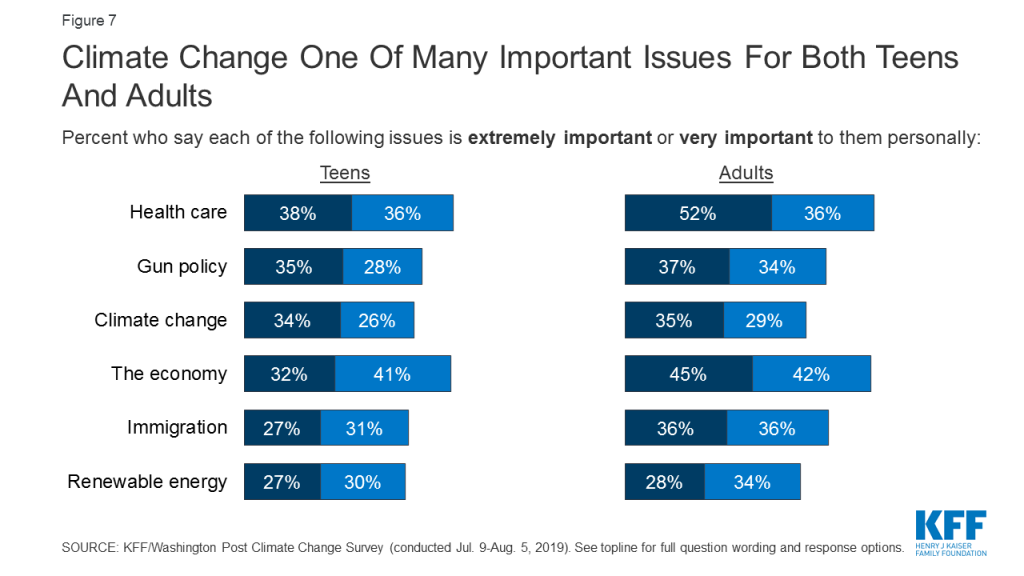
The issue of climate change evokes a variety of emotions for teens, though young adults are even more likely than teens to say they feel afraid, motivated, helpless, and guilty. Majorities of teens say the issue of climate change makes them feel “afraid” (57%), “motivated” (54%), and “angry” (52%). About four in ten (43%) say they feel “helpless” (vs. 53% of adults), while a smaller share (29%) say they feel “optimistic.” Young adults ages 18-29 are the age group most likely to express a variety of emotions when it comes to climate change, including “afraid” (68%), “motivated” (66%), “helpless” (66%), and “guilty” (54%). Like adults, most teens say they rarely or never discuss climate change with their family. Moreover, teens are 8 percentage points less likely than adults to say they at least occasionally discuss the issue with friends (38% vs. 46%).
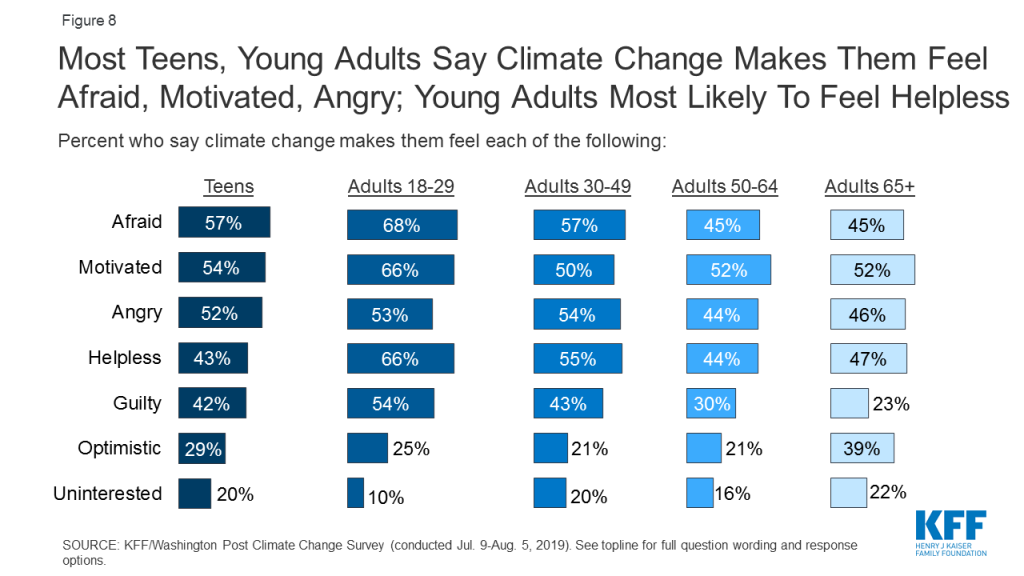
Most teens feel they can make a difference when it comes to climate change, and about a quarter report engaging politically on the issue. Almost two-thirds of teens who believe in human-caused climate change (55% of all teens) say they feel that there are things they can do personally to make a difference when it comes to reducing the effects of climate change. About four in ten teens (41%) say they have taken action to reduce their own carbon footprint. In addition, about one-quarter report engaging in some type of political action in the past 3 years to express their views on climate change; this includes 15% who say they’ve participated in a school walk-out, 13% who have participated in a protest or rally, and 12% who have contacted a government official. Some groups of teens are more likely than others to report engaging in political action around climate change, including those who are Black (33%) or Hispanic (30%), older teens ages 16-17 (31%), and those who identify as Democrats or lean Democratic (30%).

Hispanic teens (and to a lesser extent, Black teens) stand out as particularly concerned and particularly active on the issue of climate change. In addition to being more likely to engage in political action, Black (37%) and Hispanic (41%) teens are more likely than White teens (24%) to think people need to act within the next year or two in order to prevent the worst effects of climate change. Hispanic teens (44%) are also more likely than White (32%) or Black (25%) teens to say climate change is an extremely important issue to them personally. Furthermore, Hispanic teens are more likely than White teens to say the issue makes them feel afraid (65% vs. 53%), angry (61% vs. 48%), guilty (51% vs. 38%), and helpless (50% vs. 39%).
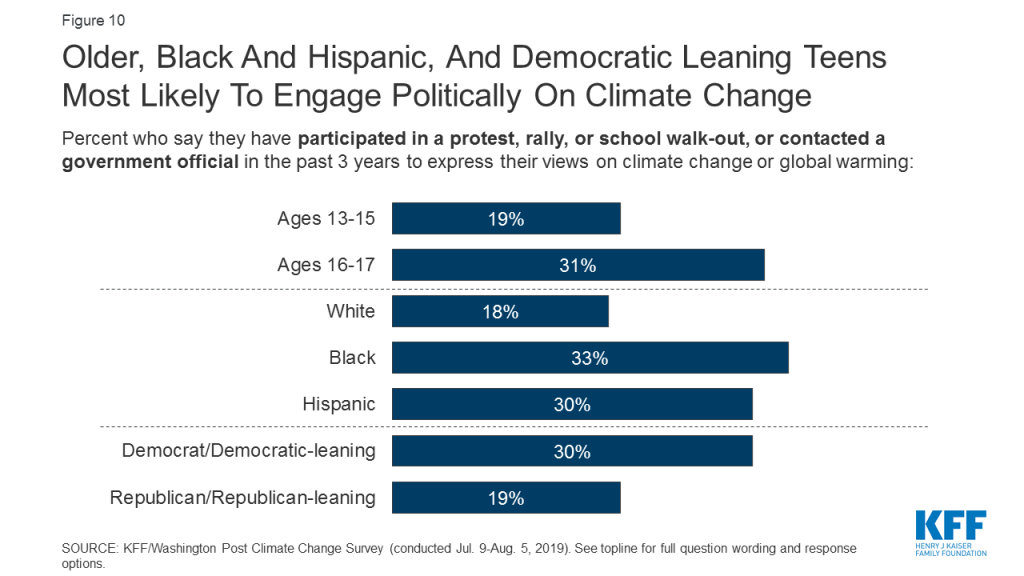
About half of teens say they have learned about the causes of climate change in school, yet some misconceptions about major contributors to climate change remain. Fifty-four percent of teens say they have learned at least a moderate amount about the causes of climate change in school, while 46% say they have learned about ways to reduce the effects of climate change. The share saying they have learned “a lot” about ways to reduce the effects of climate change has decreased somewhat since a similar survey of teens conducted in 2010 (from 25% to 14%). Six in ten teens recognize deforestation (62%), cars and trucks (62%), and burning fossil fuels for heat and electricity (61%) as major contributors to climate change, while fewer recognize airplane travel (30%) and cattle farming (18%) as major contributors. At the same time, about four in ten teens (39%) mistakenly believe that “the sun getting hotter” is a major contributor to climate change, and one in five think volcanic eruptions are a major contributor.
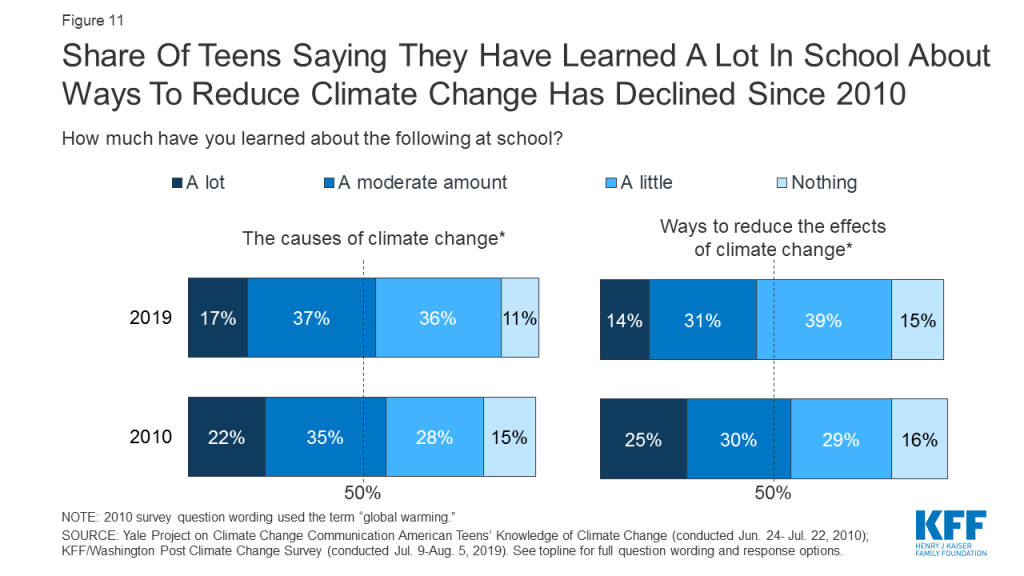
Views On The Green New Deal
In February 2019, Representative Alexandria Ocasio-Cortez of New York and Senator Edward J. Markey of Massachusetts introduced the Green New Deal resolution calling on the federal government to dramatically reduce fossil fuel use and guarantee clean energy jobs. The survey finds that few Americans are familiar with the Green New Deal, though Republicans are more likely to have heard about it than Democrats. While the public likes many of the proposal’s goals, they oppose the increase in federal spending that would likely be needed to support them.
The Green New Deal is largely unknown to the public, with just about one in five saying they have heard a great deal (7%) or a good amount (15%) about the proposal. Republicans (33%) are twice as likely as Democrats (16%) to say they’ve heard at least a good amount, suggesting that anti-Green New Deal messaging has gotten more exposure than supportive messaging at this point.

Six in ten adults (59%) say they haven’t heard enough to have an opinion of the Green New Deal, but among those who’ve heard at least a good amount, nearly six in ten are opposed.
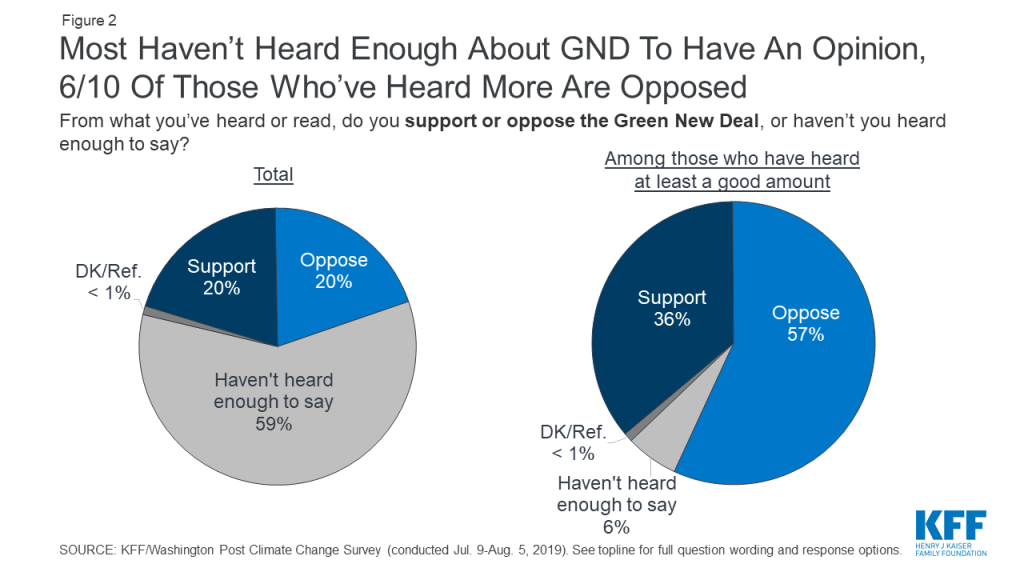
Among those who’ve heard at least a little about the Green New Deal proposal, four in ten say it’s realistic and just over half (53%) say it’s not realistic, including 26% of Democrats, 59% of independents, and 84% of Republicans.
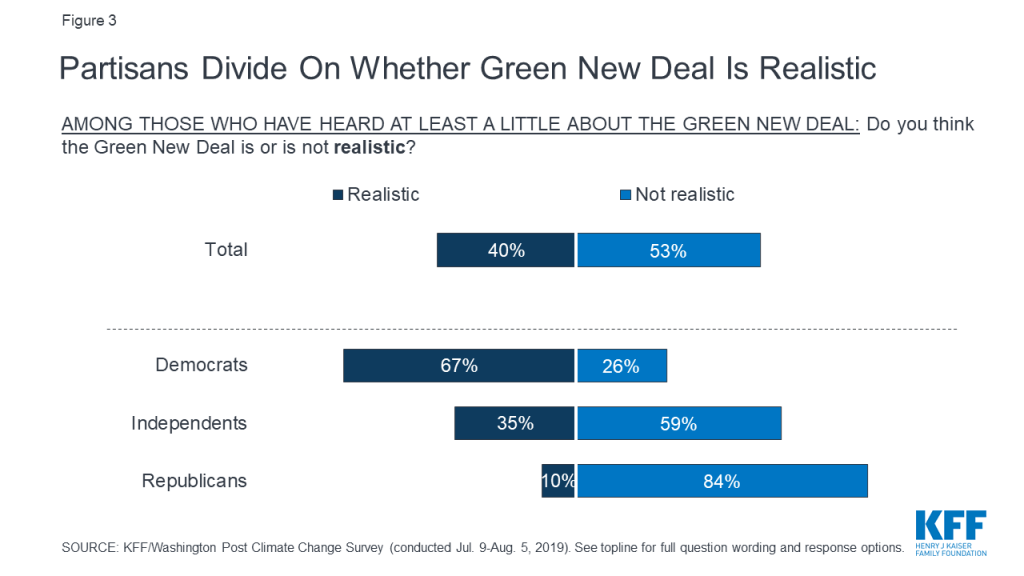
Substantial majorities of the public say they would support the Green New Deal if they heard it would guarantee jobs with good wages for all U.S. workers (78%), upgrade all buildings in the U.S. to increase energy efficiency (70%), set a goal for 100% of U.S. power coming from zero-emission energy sources within ten years (69%), provide all people in the U.S. with health care through a new government program (68%), and increase federal spending on infrastructure to help communities prepare for climate change-related disasters (67%). Yet support drops to just 30% if the proposal would increase federal spending by trillions of dollars.
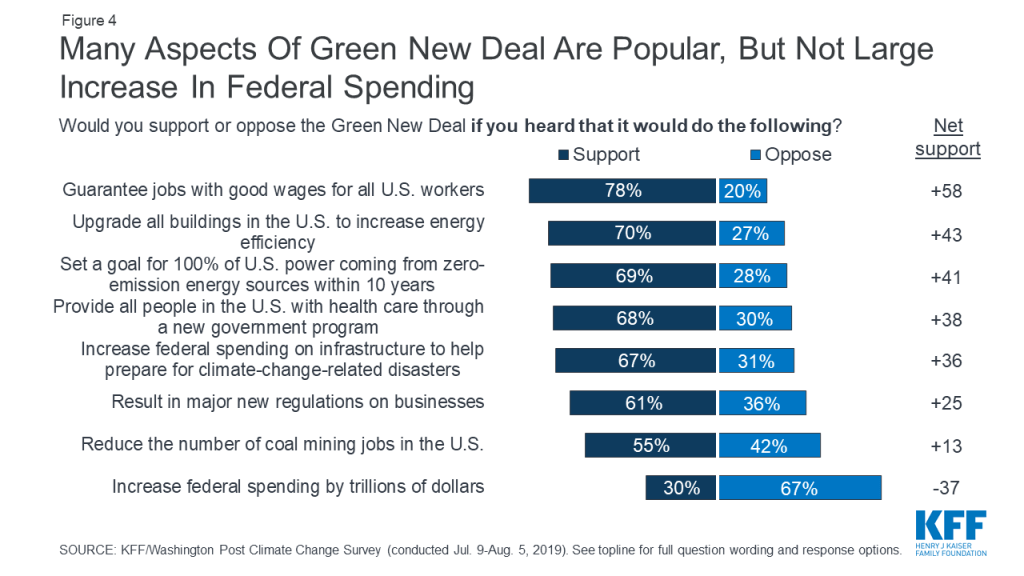
There does not appear to be an appetite among the public for increasing the national debt in order to pay for climate-related policies such as the Green New Deal. Nearly six in ten (57%) say they oppose adding to the national debt in order to pay for policies aimed at reducing greenhouse gas emissions in the U.S., rising to 66% when initial supporters are told that the debt currently stands at around $22 trillion.
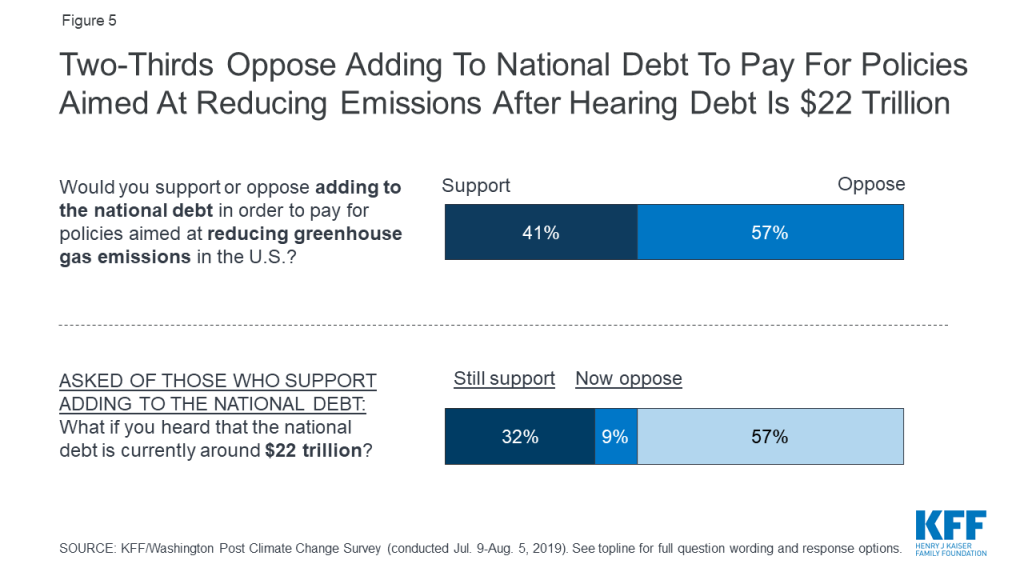
Politics And Regional Differences
Many previous surveys have found that Americans’ views on climate change divide along partisan lines. In this survey, we explore how those divisions relate to political preferences, and also how partisanship interacts with people’s views of the role of climate change in extreme weather events. This section takes advantage of a unique element of this survey: the oversample of people living in several regions of the U.S. that have experienced extreme weather events like hurricanes, flooding, drought, and wildfires over the past several years.
Majorities across parties say they want the next president to support government action on climate change, but it’s a much lower priority for Republicans than for Democrats. Large majorities of Democrats (91%) and independents (79%), and even a slim majority of Republicans (53%), say that they would like the next president to be someone who favors government action on climate change, suggesting that President Trump’s position on the issue is out of step with the mainstream. However, while 42% of Democrats see this as an extremely important issue to their vote – putting it on par with issues like abortion access (39%) and preserving the ACA (38%) – just 12% of Republicans say the same, ranking it far behind issues like support for a border wall (48%) and restricting abortion access (34%).
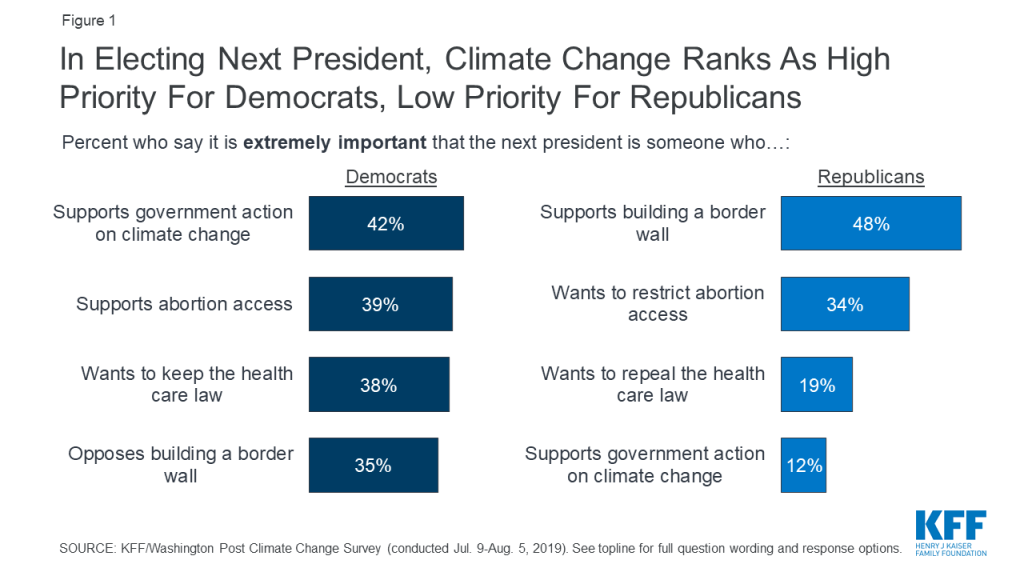
Nationally and across regions, Democrats and Republicans have very different views of severe weather events in their area and the role climate change plays. Nationwide, about two-thirds (65%) of adults think extreme weather events are becoming more severe, but this masks a massive partisan difference, with Democrats almost twice as likely as Republicans to believe this is the case (81% vs. 43%).
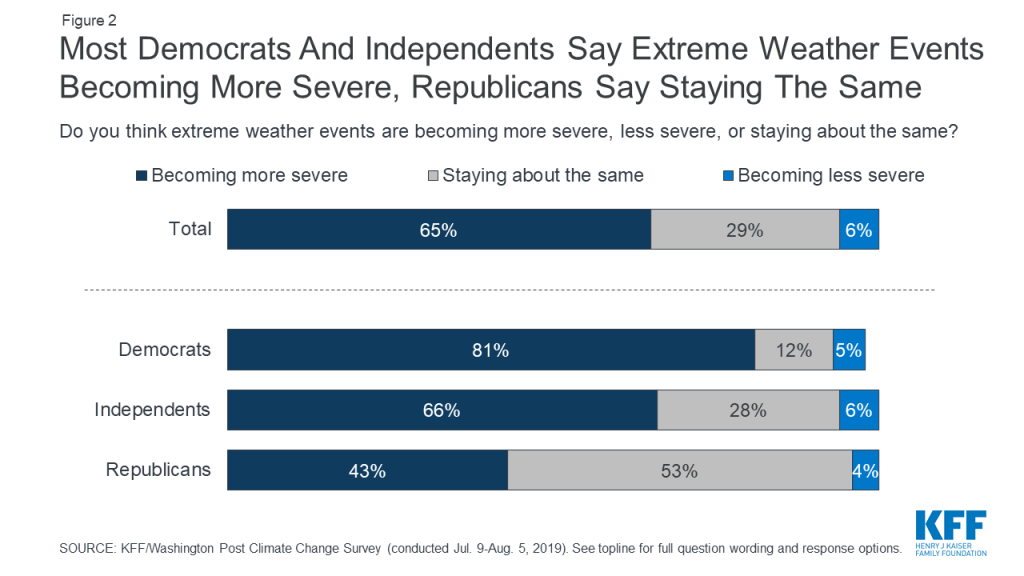
The partisan divide on views of extreme weather is even starker when looking at the share who believe weather is becoming more severe and that climate change is mostly to blame: 43% of Democrats versus 9% of Republicans think this is true.
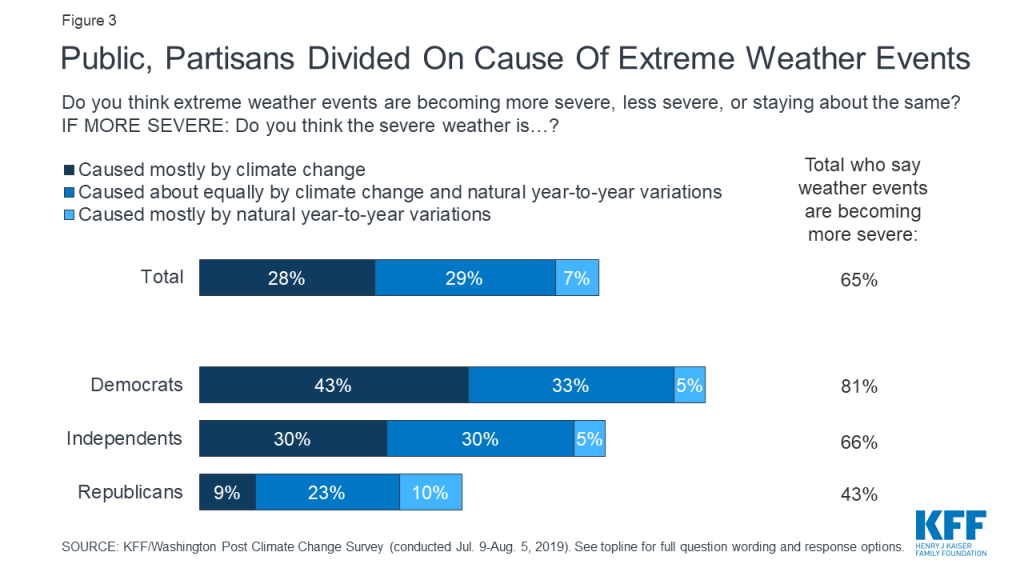
Partisan gaps also exist in perceptions of extreme weather in one’s own local area. When drilling down into regions that have been hard hit by extreme weather events, there are huge partisan gaps in attitudes about climate change’s role in these events. For example, in the Southwest, 58% of Democrats and Democrat-leaning independents versus just 17% of Republicans and Republican-leaning independents say that the area where they live has experienced wildfires in the past 5 years and that climate change is a major factor causing these fires. Similarly, in the Southeast/Gulf Coast region, those who identify as or lean Democrat are about three times as likely as Republican-leaners to say climate change is a major factor contributing to severe storms such as hurricanes in their area in the past 5 years (61% vs. 21%)1 .
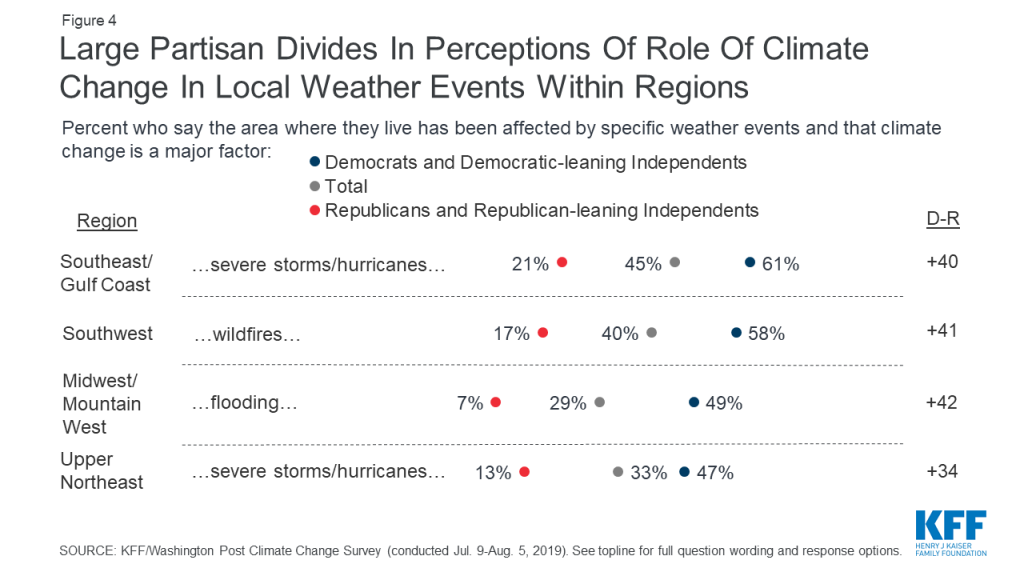
Knowledge And Actions
What does the public understand about the major contributors to climate change, and what actions do they report taking to reduce their own carbon footprints?
Most adults have a pretty good gauge on the major contributors to climate change, but some misperceptions exist. Majorities of the public recognize deforestation (63%), automobiles (58%), and burning fossil fuels for heat and electricity (56%) as major causes of climate change. Fewer recognize the major contribution of airplane travel (24%), cattle farming (21%), and cement manufacturing (15%). On the other hand, 43% think that plastic bottles and bags are a major contributor to climate change, when in fact they play more of a minor role compared to other factors. Substantial shares think other non-related factors such as “the sun getting hotter” (37%), volcanic eruptions (19%), and water usage (18%) are major contributors.
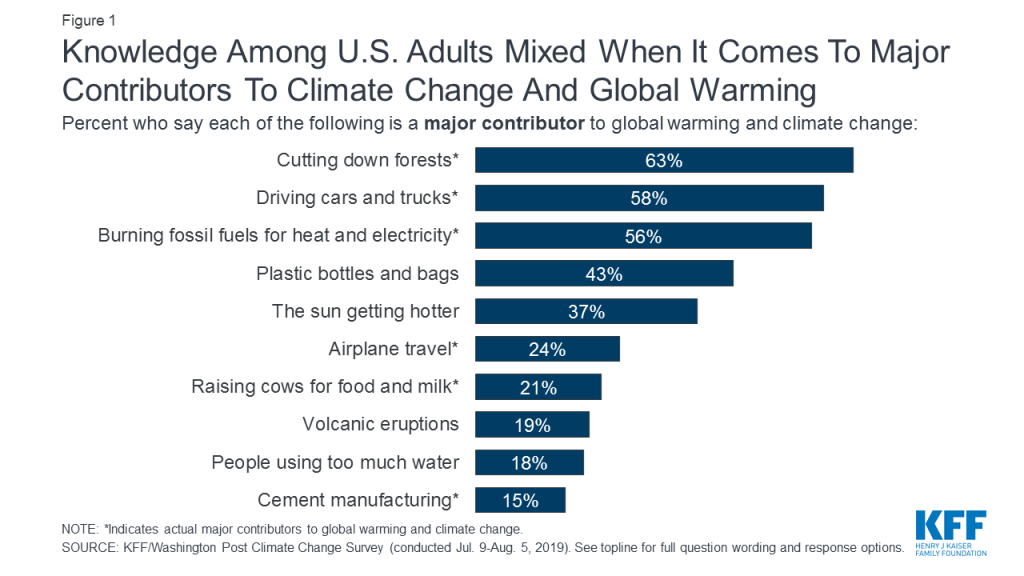
About half of adults say they have taken action to reduce their own carbon footprint, with a range of actions reported. About half (53%) of U.S. adults say they have taken actions to reduce their own carbon footprint in the past 2 years. Some of the actions people report taking target the major contributors of climate change: 20% report driving less, 14% use less electricity at home, 9% use a more fuel-efficient car, and 3% purchase electricity from a renewable source. However, some report actions that, while good for the environment, are less likely to make a major dent in climate change: 20% say they recycle, 7% reduce plastic use, 6% mention conserving water, and 4% mention using reusable items like bags, containers, and straws.
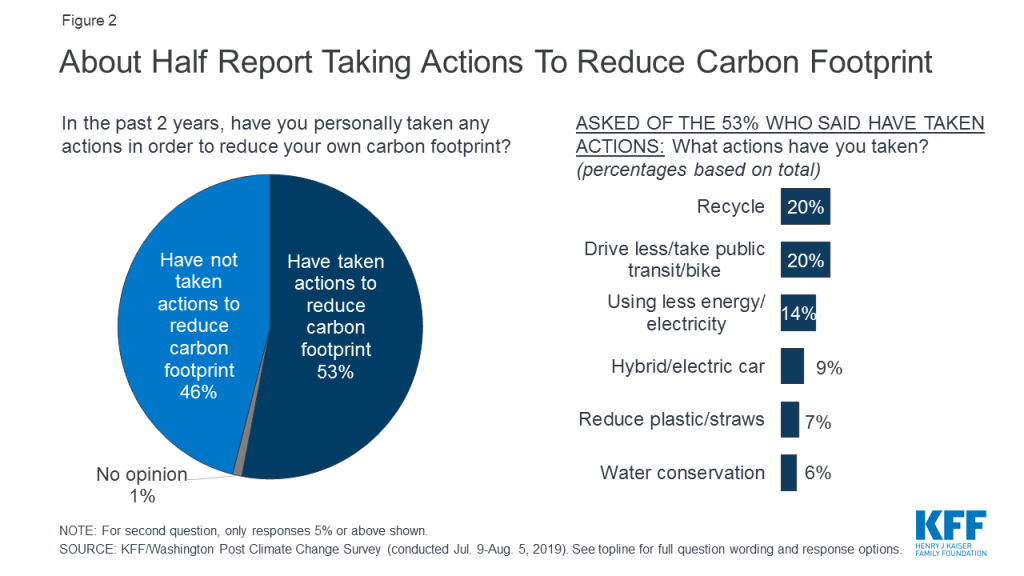
Methodology
The Washington Post-Kaiser Family Foundation Survey Project is a partnership combining survey research and reporting to better inform the public. The Post-KFF Climate Change Survey, the 34th in the series, was conducted with a probability-based sample of 2,293 adults ages 18 and over and 629 teens between the ages of 13 and 17. Interviews were administered online and by telephone from July 9 through August 5, 2019 in English and Spanish.
NORC at the University of Chicago conducted sampling, interviewing, and tabulation for the survey using the AmeriSpeak Panel, a representative panel of adults age 18 and over living in the United States. AmeriSpeak Panel members are recruited through probability sampling methods using the NORC National Sample Frame, an address-based sampling frame. Panel members who do not have internet access complete surveys via telephone, and internet users complete surveys via the web (for the current study, 303 adults and 8 teens completed via phone; 1,990 adults and 621 teens via web). In order to allow for separate regional analysis, adult panelists living in the following regions were selected at disproportionately higher rates: Southwest (Arizona, New Mexico, Nevada, Utah, Colorado); Upper Mountain West/Midwest (Minnesota, North Dakota, South Dakota, Montana, Idaho); New England (Maine, New Hampshire, Vermont, Massachusetts, Connecticut, Rhode Island); and Southeast (Florida, Georgia, South Carolina, North Carolina, Alabama, Mississippi, Louisiana, Texas gulf coast counties: Orange, Jefferson, Chambers, Galveston, Harris, Brazoria, Matagorda, Jackson, Calhoun, Victoria, Refugio, Aransas, San Patricio, Nueces, Kleberg, Kenedy, Willacy, Cameron).
Fully enrolled teens (i.e., those for whom NORC has obtained parent consent, teen assent, and a complete teen profile) were eligible for sampling and recruitment from NORC’s AmeriSpeak Teen Panel, a probability-based panel of teens recruited via parents in the AmeriSpeak adult panel.
The combined results for teens and adults have been adjusted to weight oversampled geographic areas back to their accurate share of the adult population and to account for systematic nonresponse along known population parameters.
For adults, the first weighting stage made adjustments to account for the regional oversampling and for differential nonresponse to the survey screening interview. In the second weighting stage, the sample was adjusted to match known demographic distributions of the U.S. population using the following parameters: age, sex, education, race/ethnicity, and Census Division. Interviews in the oversampled regions were also weighted to match demographics within those regions. Region-level population benchmarks were obtained from the U.S. Census Bureau’s American Fact Finder for race/ethnicity and from the U.S. Census Bureau’s 2017 American Community Survey (ACS) for all other benchmarks.
The teen sample was weighted using a similar procedure, except that there was no regional oversampling for the teen sample so no oversample adjustment was needed. Demographic benchmarks for teens were obtained from the 2017 ACS for age, sex, parents’ highest education, race/ethnicity, and Census Division.
The margin of sampling error including the design effect for the full sample is plus or minus 3 percentage points for adults and 5 percentage points for teens. All statistical tests of significance account for the effect of weighting. For results based on other subgroups, the margin of sampling error may be higher. Sample sizes and margins of sampling error for other subgroups are available by request. Note that sampling error is only one of many potential sources of error in this or any other public opinion poll.
This questionnaire was administered with the exact questions in the exact order as appears in this document; question numbering may not be sequential. If a question was asked of a reduced base of the sample, a parenthetical preceding the question identifies the group asked.
The Kaiser Family Foundation and The Washington Post paid for the survey and representatives of The Washington Post and the Kaiser Family Foundation worked together to develop the survey questionnaire and analyze the results. Each organization bears the sole responsibility for the work that appears under its name. The project team from the Kaiser Family Foundation included: Mollyann Brodie, Ph.D., Liz Hamel, Lunna Lopes, and Cailey Muñana. The project team from The Washington Post included: Scott Clement and Emily Guskin. Both The Washington Post and the Kaiser Family Foundation Public Opinion and Survey Research team are charter members of the Transparency Initiative of the American Association for Public Opinion Research.
Endnotes
- Southwest includes California, Arizona, New Mexico, Nevada, Utah, and Colorado. Upper Mountain West/Midwest includes Minnesota, North Dakota, South Dakota, Montana, Idaho. Upper Northeast includes Maine, New Hampshire, Vermont, Massachusetts, Connecticut, Rhode Island, New York, and New Jersey. Southeast includes Florida, Georgia, South Carolina, North Carolina, Alabama, Mississippi, Louisiana, and the gulf coast counties of Texas (Orange, Jefferson, Chambers, Galveston, Harris, Brazoria, Matagorda, Jackson, Calhoun, Victoria, Refugio, Aransas, San Patricio, Nueces, Kleberg, Kenedy, Willacy, and Cameron counties). ↩︎